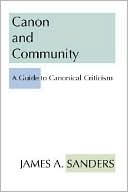
After reading James Sanders' Torah and Canon, I made my way through its brief companion and sequel, Canon and Community. Sanders holds that historical critics, whether they meant to or not, have effectively "de-canonized" parts of the Bible. If some part of the Bible is deemed to be an interpolation, spurious, or somehow later than the larger literary unit in which it is contained, it is seen as having less authority, or perhaps simply less usefulness within the community of faith, than other parts of the Bible. Therefore, we might see letters of disputed Pauline authorship, such as Ephesians, as having less value or authority than those of undisputed authorship, such as 1 Corinthians. Or, to use a much smaller literary unit, we might question the value of Mark 16:9-20, which is almost universally believed to be a later addition to the original ending of Mark at 16:8. If vv. 9-2o weren't part of the original witness of the evangelist, should they have the same functions and value as those parts that are believed to be original (whatever "original" might mean in this context)? Sanders' answer is, basially, "Of course." Canon is always the product of a process, and the addition of these verses is simply a reflection of the church's process of canonization. It was not simply the original witness that was canonized, but a larger literary product that includes these additional verses. Insofar as they remain part of the life and witness of the community of faith, then they continue to function as canon. But when we remove them from our corporate life and witness, then we have functionally, if not formally, de-canonized them, and therefore we deprive ourselves of the full range of the church's scripture.
Very interesting stuff. Sanders' work has shown me that I have a lot to learn about these kinds of issues.
No comments:
Post a Comment